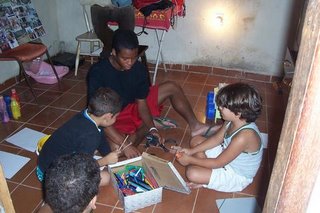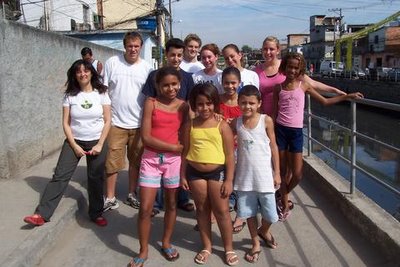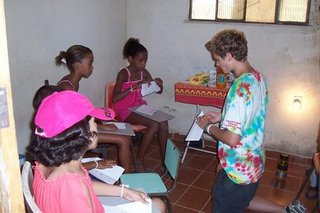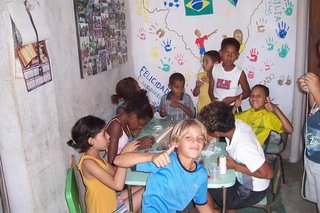A Busy Friday at the Casa
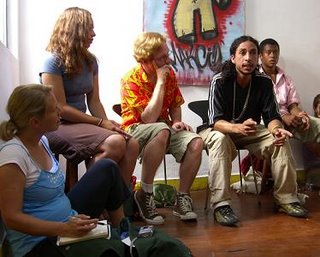 Today - Friday July 21st - CatComm's Casa was boiling over with activities typical of the range of possibilities for the space. We started the afternoon at 2pm with a question-and-answer session, and goodbye gathering, for the youth from Denver's Odyssey Institute who had been interning during two weeks with two community members of Catalytic Communities' local network.
Today - Friday July 21st - CatComm's Casa was boiling over with activities typical of the range of possibilities for the space. We started the afternoon at 2pm with a question-and-answer session, and goodbye gathering, for the youth from Denver's Odyssey Institute who had been interning during two weeks with two community members of Catalytic Communities' local network.Over the previous two weeks, the 9 young people, coordinated by Laryl Hutchin, Odyssey's founder, had been interning with Neuza Nascimento's community group, CIACAC, in Parada de Lucas favela; and Deley Cunha's group, Fifth Element, in Acari. Both communities have their bouts of violence, but at the moment were fairly tranquil, and so we deemed it safe for the youth to work there. As described in last week's blog by Rafael Rivero (see below), Odyssey kids helped CIACAC establish their new community center in Parada de Lucas. In the case of the Fifth Element, they participated in activities with local youth ranging from handball to IT.
Unfortunately, the internships in Acari were cut short. It was deemed safest to do so after a police confrontation with local drug traffickers overnight in the middle of their internship. The group decided to discontinue their internship activities there the following morning. As a result, Deley and the Odyssey youth agreed to meet in neutral territory, at the Casa, this afternoon. This was their opportunity to say goodbye and to sit and talk with Deley, and Wesley Denílio, a youth leader from Acari, about the conditions that led to their shortened internship.
 During the 3-hour meeting, Deley and Wesley clarified the nature of violence in Acari, known for its ranking as the neighborhood with the lowest development index rating in the city. They spoke of families where one young person earns thousands of dollars a year for involvement in the drug traffic, and supports his siblings through college. They talked of the lack of opportunity in the state of Rio, a state whose GDP hasn't risen in 31 years while population has.
During the 3-hour meeting, Deley and Wesley clarified the nature of violence in Acari, known for its ranking as the neighborhood with the lowest development index rating in the city. They spoke of families where one young person earns thousands of dollars a year for involvement in the drug traffic, and supports his siblings through college. They talked of the lack of opportunity in the state of Rio, a state whose GDP hasn't risen in 31 years while population has. After this evocative and emotional goodbye, at 5pm CatComm's doors opened to a new group of visitors. Led by Sandonei, a representative from the IICD -- Institute for International Cooperation and Development -- who spent 9 months volunteering in Africa, we hosted a lecture on "Volunteerism in Africa." Some 20 participants joined in hearing about opportunities that exist in this area. We expect to see a few of our local leaders from Rio heading to Africa in the not-too-distant future, for an amazing kind of peer-to-peer exchange where international volunteerism ceases to be top-down and instead involves horizontal exchanges.
After this evocative and emotional goodbye, at 5pm CatComm's doors opened to a new group of visitors. Led by Sandonei, a representative from the IICD -- Institute for International Cooperation and Development -- who spent 9 months volunteering in Africa, we hosted a lecture on "Volunteerism in Africa." Some 20 participants joined in hearing about opportunities that exist in this area. We expect to see a few of our local leaders from Rio heading to Africa in the not-too-distant future, for an amazing kind of peer-to-peer exchange where international volunteerism ceases to be top-down and instead involves horizontal exchanges.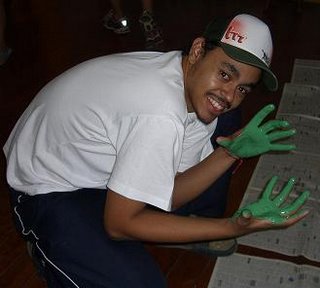 After 6 pm the tone changed from one of intense discussion to one of friendly networking when we launched our latest community art exhibition. Márcio and Dante, local graffitti artists, displayed 9 of their works on canvas to the public. Several of their friends from the hip hop movement joined in the exhibition, performing rap and showing film. Márcio traced his relationship with the Casa, where he had his first art showing exactly 3 years ago and, since then, was selected by Nós do Cinema (a local NGO that trains favela youth in movie production) through their workshop at the Casa, to undergo trainings. As a result, Márcio has now produced 3 of his own independent short films. Some 50 visitors came to their launch, and at the end of the night 5 of the pieces had been sold, the most successful launch we've had to date.
After 6 pm the tone changed from one of intense discussion to one of friendly networking when we launched our latest community art exhibition. Márcio and Dante, local graffitti artists, displayed 9 of their works on canvas to the public. Several of their friends from the hip hop movement joined in the exhibition, performing rap and showing film. Márcio traced his relationship with the Casa, where he had his first art showing exactly 3 years ago and, since then, was selected by Nós do Cinema (a local NGO that trains favela youth in movie production) through their workshop at the Casa, to undergo trainings. As a result, Márcio has now produced 3 of his own independent short films. Some 50 visitors came to their launch, and at the end of the night 5 of the pieces had been sold, the most successful launch we've had to date. All in all, between these three activities, the Casa today welcomed over 80 different people, at least 20 of them new. Others were old friends and community leaders from our network of over 950 local leaders. At least 4 nationalities were represented -- Brazilian, American, English, and Scottish.
All in all, between these three activities, the Casa today welcomed over 80 different people, at least 20 of them new. Others were old friends and community leaders from our network of over 950 local leaders. At least 4 nationalities were represented -- Brazilian, American, English, and Scottish.A day typical of what we do, and typical of the world we are working to build: of mutual reinforcement, solution exchange, and horizontal networking, worldwide.


